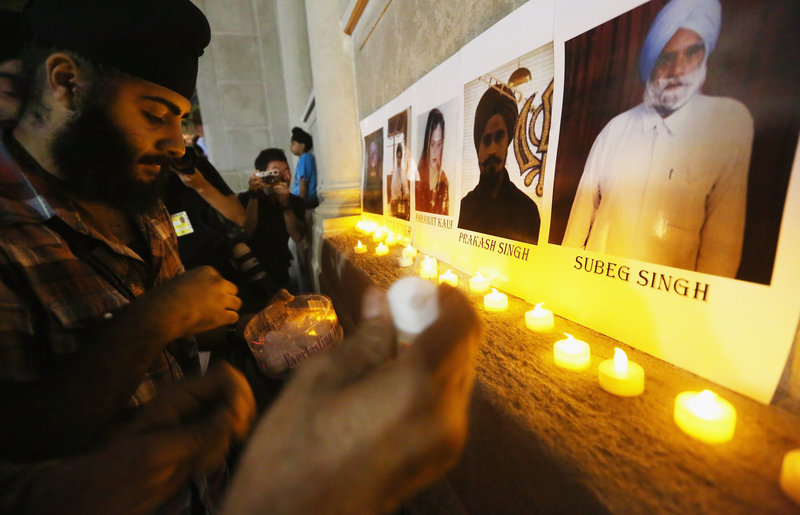
August 05, 2020

In or about this time of the year, every year, the Sikh community pauses to remember the community members who became victims of the shooting at the Oak Creek, Wisconsin Gurdwara. Six Sikh lives were lost, and others were wounded. But, Satwant Singh Kaleka, Paramjit Kaur, Sureg Singh Khatta, Prakesh Singh, Ranjit Singh, and Sita Singh are not forgotten. Santokh Singh, Lt. Brian Murphy, and Baba Punjab Singh, who died from his wounds on March 2, 2020, are also not forgotten. Brian Murphy, a cop on duty, ‘a hero,’ took fifteen bullets while defending the people inside the Gurdwara Sahib. By commemorating this day and remembering the victims each year, the Sikh community has a renewed opportunity to reflect and consider ways to prevent hate crimes.
Sikh Americans continue to be the victims of hate crimes. This year alone, there have been incidents of vandalism and hate. To name a few, on January 13, 2020, vandals painted a swastika. They wrote “white power” on a sign in front of Guru Maneyo Granth Gurdwara Sahib on Walnut Avenue in Orangevale, Sacramento County, California. In a recent incident, on July 25, 2020, a Sikh community leader Mr. Amit Pal Singh, chairman of the Sikh Society of Central Florida, was a victim of hate language sprayed across his car.

“These racist messages intimidate and ostracize a community known for its service to others,” states Jasmit Singh of UNITED SIKHS. The gurdwaras have langars for all those who visit the temple, and Sikhs are known for their humanitarian aid. We must do more and more to educate Americans about Sikhs and the Sikh faith,” Singh added.
As the fifth-largest religion in the world, Sikhism tenets preach gender and racial equality, religious tolerance, helping one’s neighbors, and serving those less fortunate. Yet, the FBI’s latest annual report on hate crimes shows a 200% spike in anti-Sikh violence in the U.S. compared to 2017 (https://ucr.fbi.gov/hate-crime/2018/tables/table-5.xls). “Often, the most insidious attacks on the community begin in the classroom,” says Mr. Singh. “We as a community and society at large must remember the murders in Wisconsin and seek to improve or find better ways each day to educate our children and others about acceptance and tolerance. We must find alternatives to hate.”

Jasmit Singh, the Advocacy Director of UNITED SIKHS, states, “There are ten important ways in which the Sikh community can act to combat hate and commemorate the victims of hate.
These include:
1) REMAIN VOCAL: Speak and encourage others to tell their stories about hate and bullying;
2) CREATE COALITIONS TO COMBAT HATE: Bring your friends with you;
3) SUPPORT AND REMEMBERING THE VICTIMS: Keep close communication with victims and their families and commemorate the important dates and victims names;
4) EDUCATE: Meet leaders, schoolteachers and create community events to speak about the Sikh community and its civic deeds;
5) SEEK HELP: Cooperate with police and law enforcement whenever there is an incident of hate;
6) TAKE A STAND: Denounce hate in any form and towards anyone;
7) HOLD LEADERS ACCOUNTABLE: Petition to create elementary peer groups and changes in the primary school curriculums;
8) REGISTER AND COME OUT AND VOTE;
9) ANSWER THE CENSUS: This will enable the community to receive services like civil rights funding; and
10) REMAIN VIGILANT.
The community must be vigilant during times like these,” said Wanda Sanchez Day, the National Legal Director at UNITED SIKHS. “In times of national emergencies, like the COVID-19 pandemic, discrimination can manifest itself through our lack of sensitivity to others’ beliefs and in ways we are unaware,” she added. The UNITED SIKHS has worked diligently to educate policymakers at all levels of government about anti-Sikh hate crimes. We encourage community members to document all hate incidents—including non-criminal activities such as hate speech—through our link. This data helps us work with law enforcement agencies to better understand the full magnitude of the problem. In 2013, after a successful campaign with Sikh organizations, the FBI agreed to track anti-Sikh hate crimes, giving policymakers official data about anti-Sikh violence for the first time in our nation’s history. To Know your Rights, see resource.
Together, we must stand against hate and hate crimes.
Manvinder Singh
Legal Director
UNITED SIKHS
1.888.243.1690
law-usa@unitedsikhs.org








